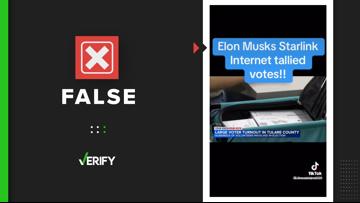On Wednesday, Dec. 6, four Republican presidential candidates participated in a debate at the University of Alabama in Tuscaloosa. It was the fourth GOP primary debate ahead of the 2024 presidential election.
Former New Jersey Gov. Chris Christie, Florida Gov. Ron DeSantis, former United Nations Ambassador Nikki Haley and entrepreneur Vivek Ramaswamy took part in Wednesday’s debate.
Former President Donald Trump did not participate in the debate, hosting a fundraiser in Florida instead.
VERIFY fact-checked several claims from the debate.
THE CLAIM
Ron DeSantis, on Nikki Haley’s position on allowing children to obtain gender-affirming care: “She thinks it's fine and the law shouldn't get involved with it.”
THE SOURCES
- Statements made by Haley in June 5 interview with CBS Mornings
- Statements made by Haley in May 3 interview with WPDE-TV
THE ANSWER
Haley said in an interview that “the law should stay out of” the issue of gender-affirming care, but has also stated she opposes such care for minors.
WHAT WE FOUND
In a June 5 interview on CBS, anchor Tony Dokoupil asked Haley about her stance on gender-affirming care.
“What care should be on the table when a 12 year old child in this country, assigned female at birth, says ‘actually, I feel more comfortable living as a boy.’ What should the law allow the response to be?” Dokoupil asked.
Haley responded by saying, “I think the law should stay out of it, and I think parents should handle it. This is a job for the parents to handle. And then when that child becomes 18 if they want to make more of a permanent change, they can do that.”
In an earlier interview with WPDE-TV on May 3, Haley made more specific statements about her stance on the issue.
“You shouldn’t allow a child to have a gender-changing procedure, until the age of 18 when they are an adult and can make that decision, but we shouldn’t have taxpayers dollars ever going to that,” she said.
Haley also posted her response to WPDE-TV on her own YouTube channel.
Haley’s campaign has responded to similar claims made by DeSantis before the debate with a statement, issued to various news outlets, reading in part, “Nikki Haley has long said she opposes gender-changing surgeries for minors. Bald-faced lies won’t save DeSantis.”
VERIFY requested explanation from the campaign on the assertion that DeSantis’s statement is a lie, but has not yet received a response.
THE CLAIM
Vivek Ramaswamy: “...We discovered this week that [Democratic donor Reid Hoffman] is one of Nikki Haley’s largest supporters.”
THE SOURCES
- Reid Hoffman post on LinkedIn
- News reports from the Washington Post and Forbes
THE ANSWER
Yes, Democratic donor Reid Hoffman supported Nikki Haley’s presidential campaign.
WHAT WE FOUND
In a post on LinkedIn, the social media platform’s co-founder and well-known Democratic donor Reid Hoffman said he “provided financial support to Nikki Haley's super PAC.”
Dmitri Melhorn, Hoffman’s longtime political adviser, also confirmed to Forbes and the Washington Post that Hoffman donated $250,000 to a pro-Haley PAC called Stand for America.
“I have invested in the Stand for America PAC supporting Nikki Haley because I agree with Jamie Dimon’s recent comments that Democrats should support Haley in the primary and Biden in the general election,” Hoffman wrote in the LinkedIn post.
While Hoffman said in his post that he will still “enthusiastically vote for Joe Biden” during the 2024 presidential election, his “first priority is to defeat” former President Donald Trump.
Hoffman added that he is supporting Haley because he believes she is “the only Republican nominee other than Trump with any chance of winning the GOP nomination.”
THE CLAIM
Ron DeSantis: “Biden wants a central bank digital currency. They want to get rid of cash.”
THE SOURCES
- The Federal Reserve
- Executive Order 14067
- Search of U.S. Congressional legislation
- The Atlantic Council, a nonpartisan U.S. think tank
- Aaron Klein, senior fellow in economic studies at the Brookings Institution
THE ANSWER
The federal government is not planning to replace cash with a central bank digital currency.
WHAT WE FOUND
Under Biden’s Executive Order 14067, the Federal Reserve is tasked with looking into how a central bank digital currency (CBDC) might be created, and evaluating necessary steps and requirements for implementing one.
A CBDC is digital money “backed and issued by a central bank,” according to The Atlantic Council. In the United States, that central bank would be the Federal Reserve.
The U.S. does not currently have a CBDC and the Fed has not made any decisions on issuing a digital dollar. On its website, the Federal Reserve says it would only move forward with issuing a CBDC with “an authorizing law” passed by Congress.
Congress has not passed a law authorizing the Federal Reserve to issue a CBDC, though some lawmakers have introduced legislation aimed at preventing a digital dollar in the U.S.
If the Fed does issue a digital dollar in the future, it does not mean the government would get rid of cash.
“There is nothing in the executive order that ends or eliminates cash. Period,” Aaron Klein, senior fellow in economic studies at the Brookings Institution, previously told VERIFY.
The Federal Reserve also says that it is “committed to ensuring the continued safety and availability of cash and is considering a CBDC as a means to expand safe payment options, not to reduce or replace them.”
THE CLAIM
Moderator Megyn Kelly asked former Gov. Chris Christie about a New Jersey law that he signed in 2017 that created guidelines for schools dealing with transgender students.
Kelly said, “Those guidelines required schools to accept a child's preferred gender identity, even if the minor's parents objected. And it said that there is no duty for schools to notify parents if their son or daughter changes their gender identity.”
Christie responded: “Not true. That bill was put into effect in 2018, and regulated in 2018, after I was out of office."
THE SOURCES
- New Jersey State Department of Education
- New Jersey Senate Bill 3067 in the 2016-2017 legislative session
- New Jersey School Boards Association
THE ANSWER
The New Jersey State Department of Education issued a series of guidelines for protecting trans students in 2018, after Christie left office. However, the guidelines were issued as the result of a law signed by Christie in 2017.
WHAT WE FOUND
In 2017, Gov. Chris Christie signed New Jersey Senate Bill 3067 into law. The legislation instructed the state’s Department of Education to issue guidelines to schools for how to handle issues pertaining to trans students.
While the law itself did not outlay specific guidelines, it did mandate that the eventual guidelines address several key issues mentioned by Kelly.
For instance, the law stated the guidelines must address “ensuring that a transgender student is addressed at school by the name and pronoun preferred by the student that corresponds to the student's gender identity, regardless of whether a legal name change or change in official school records has occurred.”
It also said the guidelines must address “confidentiality and privacy concerns, including ensuring that school personnel do not disclose information that may reveal a student's transgender status except as allowed by law, and advising schools to work with the student to create an appropriate confidentiality plan regarding the student's transgender or transitioning status.”
The final guidelines were not issued until 2018, after Christie had left office and been succeeded by Gov. Phil Murphy, a Democrat.
Those guidelines included statements such as: “A school district shall accept a student’s asserted gender identity; parental consent is not required,” and “There is no affirmative duty for any school district personnel to notify a student’s parent or guardian of the student’s gender identity or expression.”
Christie was not party to the creation of those guidelines, the language of which was cited by Kelly in her question. However, he signed the law that mandated the creation of guidelines addressing those issues.
THE CLAIM
Nikki Haley: “For every 30 minutes that someone watches TikTok every day, they become 17% more antisemitic, more pro-Hamas based on doing that.”
THE SOURCES
- Anthony Goldbloom, the founder and former CEO of data science platform Kaggle
- Social media survey data published online
- Article published by The New York Sun on Dec. 1, 2023
THE ANSWER
Haley misstates the results of one limited survey that claims spending at least 30 minutes per day on TikTok increases the chance of holding “antisemitic or anti-Israel” views by 17%.
WHAT WE FOUND
The statistic originates from a single survey conducted by Anthony Goldbloom, the founder and former CEO of a data science platform called Kaggle, and other researchers.
Haley misstates the results of the survey. It concluded that spending 30 minutes a day on TikTok “increases the chances somebody holds antisemitic or anti-Israel views by 17%.”
The survey does not say that a person becomes increasingly antisemitic with every additional 30 minutes they spend on TikTok.
It also did not ask any questions about “pro-Hamas” views as Haley claimed.
The survey queried 1,300 people under the age of 30 about antisemitic tropes, including if “Jewish people have too much power in the media” compared to other groups and whether “Jewish people chase money more than other people do.”
The data is not fully representative of TikTok’s user base, since no one over 30 years old was surveyed. In addition, the survey is not a peer-reviewed academic study, nor have the results been replicated.
When the New York Sun asked Goldbloom if the survey distinguished between “antisemitic and anti-Israel,” Goldbloom said it is difficult to split them because some of the sentiments could fall under both categories.
This story is also available in Spanish / Lee este artículo también en español: Verificamos declaraciones hechas en el cuarto debate primario republicano













